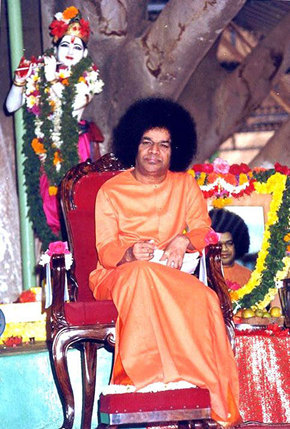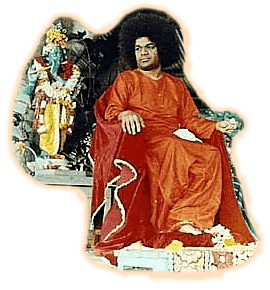|
Embodiments of Love!
 "The Bhagavad Gītā deals with the basic facts of
the gross material world and the subtle spiritual world; human society
and the human mind. The Gītā is a mirror of the mind of the total,
integral and universal man. It elevates man from the intellectual to
the spiritual level and illumines his pathway to the Paramātmā.
It elucidates the secret of total self surrender. It is an aid to the
integral and total transformation of man. It is an epitome of the
spiritual verities revealed by Lord Krishna." "The Bhagavad Gītā deals with the basic facts of
the gross material world and the subtle spiritual world; human society
and the human mind. The Gītā is a mirror of the mind of the total,
integral and universal man. It elevates man from the intellectual to
the spiritual level and illumines his pathway to the Paramātmā.
It elucidates the secret of total self surrender. It is an aid to the
integral and total transformation of man. It is an epitome of the
spiritual verities revealed by Lord Krishna."
"The Bhagavad Gītā expounds the secret of
creation and the essence of divinity. It explains the theory and
practice of all spiritual knowledge based on individual experience. We
must try and understand its true significance and practical relevance
to human destiny. The sun is the source of light on the earth. Without
the sun, the entire world will be plunged in darkness. Similarly, Lord Krishna
is the source of intellectual illumination and spiritual
enlightenment." -
Summer Showers in Brindavan 1979, p. 12
"To understand the meaning of the Gītā, the
reverential approach is necessary.... The Gītā is a text for spiritual
practitioners, for it emphasizes sādhana, and spiritual
attitudes, more than anything else. Every chapter lays down means and
methods of reaching the goal of peace and harmony. Now sādhana
is the product of keen and steady yearning for progress. The aspirant
must aspire, not despair. He must persevere, not clamor for quick
success. The Gītā is like a boat, which takes man across from the
self-imposed state of bondage to the freedom that is his nature. He is
taken from darkness to light, from lusterlessness to splendor. The Gītā
ordains for man disciplines and duties that are free from the taints of
vasanas (tendencies and impulses) that tie him to
the relentless wheel of birth and death. Really speaking, man has come
to this karmakshetra (field of activity) only to engage himself
in activity, not in order to earn the fruit of such activity. That is
the teaching of the Gītā, its fundamental lesson. The Gītā is the
quintessence of the meaning of all the Vedas.... The Gītā is
the very voice of Lord Krishna. The fact that it has provided
consolation and liberation to millions of men is evidence of its divine
origin. A lesser person could not have given it that authenticity." - Gītā Vahini, pp. 1-3
"Krishna is Purushottama, the
greatest being. We can offer our faults and foibles, and sins and
sorrows, at Krishna's feet and enjoy the highest treasure of
pure, unalloyed bliss. We must enshrine the teachings of Krishna
in our hearts and practice these precepts in our daily lives. The slokas
of the Bhagavad Gītā will banish the soka (sorrow) in our hearts
and give us abiding peace and joy." - Summer Showers in Brindavan 1979, p. 16
"The divine annunciations of the Gītā enable man
to transcend the barriers of the world and acquire divine power and
spiritual energy. All creatures are equally exposed to the celestial
radiance of sat-chit-ānanda ... However, man is so preoccupied
with the external world of sensations that he has become unconscious of
his own divinity and his natural identity with Godhead." - Summer Showers in Brindavan
1979, p. 13
"Ekam Sat - the One is Real. Truth is one
and its manifestations are many. This is the central doctrine of the
Bhagavad Gītā."
- Summer Showers in Brindavan 1979, p. 145
"For many millenia the Bhagavad Gītā has been
propagating the high ideals of the life divine. It is a peerless
spiritual text that has brought great fame to Bharat. It has been the
special privilege of Bharat to have received the Bhagavad Gītā. The
Gītā is a unique scriptural poem, unsurpassed in meta-physical content
by the texts of any other country ... The Gītā does not observe any
distinctions on the basis of caste, creed, community or nationality, or
as between men or women. It is an eclectic and catholic scripture,
transcending all man-made barriers, and of universal relevance. It
reveals the importance of one's own dharma or duty (sva-dharma)
to all those who study it in a spirit of adoration." - Summer Showers in Brindavan
1979, pp. 161-2
"Krishna taught the Gītā to Arjuna.
But He intended it for the whole of humanity. Arjuna was just an
excuse. That very Gītā is today correcting all mankind. It is not for
any particular caste, religion or nation. It is the very breath for
humans everywhere." - Dharma Vahini, p. 8
"The Gītā prompts you to seek the answers and
directs you to experience them. It helps you to control the chitta,
the agitations of the mind; it destroys delusion; it develops true
knowledge; it makes you glimpse the splendor of the Lord and confirms
your faith." -
Sathya Sai Speaks I, p. 174
"The Gītā is the greatest harmonizer of all yogas.
As a matter of fact, once the Gītā is made the guiding star of your
life, the way you act will be karma yoga, the way you feel will
be bhakti yoga, the way you reason will be jñāna yoga.
It will become automatically so. What you do, will be in line with dharma;
what you feel will foster prema; what you think must reveal sathyam."
- Sathya Sai
Speaks II, pp. 53-4
"You must all study the Gītā, daily. Read
a few slokas and meditate on the meaning yourself; it will dawn
on you in the silence of your heart. You need not read elaborate
commentaries. Each word in the Gītā is a gem. No more do you need
gemstones for the ear, the nose, and the neck; have the gem of the Gītāslokas
in your heart; let them activate your intellect and your hands." - Sathya Sai Speaks VIII,
p. 53
"Nothing that is experienced will go to waste. It
will shape the course of events; it will change attitudes and habits;
it will purify and clarify situations and outlooks. That is why I want
you to read the Gītā; it is like learning eetha (swimming),
this learning of the Gītā. Eetha saves you from drowning. Gītā
saves you from drowning in the treacherous flood of worldly desire. The
Gītā is the real purpose for which the Avatāra of Krishna was
undertaken." -
Sathya Sai Speaks IV. p. 348
"Sing the Gītā ... We are asked to sing the Gītā.
By singing the Gītā we will be turning our minds from the material
desires and mitigating our restlessness. Gītā, being the essence of Vedanta,
is the Royal road to salvation. It is the word of Sai as well." - Summer Showers in Brindavan
1973, p. 250
"Bhagavad Gītā means 'The song of God',
words that have come to us as His flowers, as His 'prasad'. Vyāsa
has woven these flowers, the words of God, into a
beautiful garland and gifted it to us. God is the basis of this world.
Bhagavad Gītā consists essentially of three parts, namely karma
kanda, upasana kanda and jnana kanda. These are being referred to
as the six-chapter contents in each case. People say that through these
three parts, Bhagavad Gītā has been teaching us various spiritual
aspects, such as bhakti or devotion, jñāna or
knowledge, yoga or meditation, and so on and so forth. But
Bhagavad Gītā, in addition to these, has really also given us the great
saying TAT TWAM ASI, meaning ' That Thou Art '. This is
the essence or the keynote of Bhagavad Gītā. The first six chapters
teach us about the jīva or the soul that resides in this body and,
through that, the nature of jīva. The next six chapters, while
teaching us the path of bhakti, also show us the nature and
content of what we call tat or 'THAT'. The last
six chapters, while giving us the content and meaning of the third word
asi, also tell us about how to realize the identity
of the self, the jīvatma, with 'THAT', the Paramātmā,
and also teach us how to give up things, how to sacrifice and reach moksha
or liberation. If we study Bhagavad Gītā in the proper way and
inquire into its contents, then we will understand the true nature of
the saying TAT TWAM ASI."- Summer Showers in Brindavan 1972, pp. 100-1
"All people do not derive the same benefit from
the Gītā. It depends on the deservedness and purity of the individual.
Ultimately, the individual is responsible for everything that he does.
Human beings may not be able to even imagine the sublime bliss of
spirituality as long as they prefer to wallow in the mire of
slothfulness.
"The Bhagavad Gītā that we read today has been
embellished by Vyāsa's poetic genius. One need not memorize all
its 'slokas' to achieve the inner tranquility of spirituality. A
single sloka from the Gītā is enough to transform our lives.
Steadfastness (sraddha) is necessary for acquiring the knowledge
of spirituality. The Bhagavad Gītā exhorts us to become fitting
instruments of God. It should be repeatedly read for intellectual
illumination and spiritual enlightenment." - Summer Showers in Brindavan
1979, p. 27
"The Bhagavad Gītā contains the quintessence of
all scriptures. It should be studied assiduously by every spiritual
aspirant. It should also be regarded as a book of great practical value
in our daily lives. It has given solace to many, and it will help you
also in your spiritual progress." - Summer Showers in Brindavan 1979, p. 29

|


